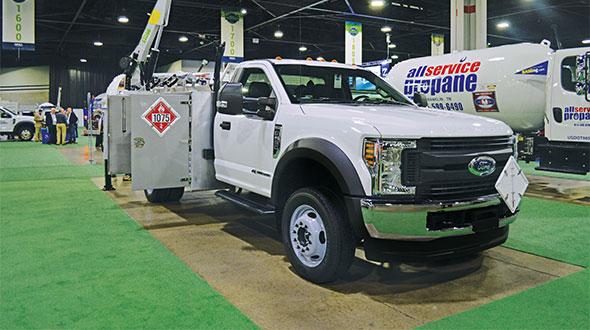Evolving your trucks to operate on autogas
Profitability and diversification: These qualities are signs of a successful business. For a retail propane operation, achieving these qualities is rooted in how the operation best markets the fuel to end users.

Converting your fleet to run on propane autogas saves money and time for your drivers. Photo by Allison Barwacz
Autogas can enhance an operation’s ability to market propane to customers. Some retailers have added autogas to their customer offerings, but autogas can be overlooked by retailers when it comes to powering their own fleets.
Bobtails, service trucks, supervisor trucks and other vehicles are still running diesel or gasoline despite having a viable auto fuel source on-site.
Retailers who choose to convert their fleets to run on propane autogas can improve their profitability and diversification. Here’s how.
Profitability
Using propane in your fleet supports the fuel retailer market and can enhance the bottom line.
“It’s good economics more than anything else,” says Ed Hoffman, president of Blossman Services – the distribution partner of Alliance AutoGas. “You think about the concept of being able to save a dollar or two over gasoline or diesel versus competitors in your marketplace.”
Using propane over gasoline or diesel can save retailers on everyday vehicle fuel costs, along with long-term maintenance costs.
Installing a fuel dispenser at your plant and having drivers refuel on-site saves time and enhances productivity. Providing gas cards to your drivers so they can fill up at a local gas station or convenience store adds time to a typical day. Having a dispenser on-site to refuel vehicles with autogas keeps refueling time down and keeps your drivers and technicians on the road.
Converting fleets is also a solid way for propane businesses to evolve.
“Sticking with the old and what works isn’t always going to be good for business,” says Todd Mouw, president of Roush CleanTech. “There is a leap of faith when it comes to changing anything, so there is a leap of faith when it comes to converting fleets to autogas. Human nature says changing isn’t easy.”
Diversification
Propane holds a solid stake in traditional markets like home heating, but retailers should look to expand their offerings to maintain a consistent gallon stream year-round. Propane autogas is an avenue retailers can take toward diversification, and it also showcases propane as a clean alternative energy.
“Overall, autogas is good for the industry,” Mouw says. “It adds diversification.”
Retailers who already market autogas understand the year-round benefits to the business. Utilizing the fuel in your own fleet is also a great marketing tool when it comes to selling the fuel to other fleets.
“It is good to show customers that retailers use autogas,” Mouw says. “It instills confidence. You can show customers first-hand the benefit of using propane autogas.”
Fleet conversion
Deciding to convert a fleet to autogas inherently presents “what” and “when” questions to propane retailers.
Retailers can convert existing vehicles or purchase propane-powered vehicles during a normal equipment lifetime. Looking at the service schedule of your vehicles will provide a good idea of the best time to convert or make a new purchase. Examining your monthly fuel costs to see where propane is most cost-effective is an important metric to understand, too.
A retailer’s bobtail is a good place to start, Mouw says, because bobtails are often the biggest expense for propane retailers. Hoffman agrees bobtails benefit from autogas, but he thinks the service truck is a good starting point.
“The best bang for your buck is on a service truck,” Hoffman says. “The service truck does not need to have diesel since it doesn’t need the carrying capacity of a bobtail. It is also the most inefficient vehicle. They are starting and stopping a lot of times, and that burns a lot of fuel.”
Supervisor or manager vehicles are other good options for the first vehicle conversion, he adds.
“Start small, then move to the rest of your fleet,” says Ronny Martinez, the autogas fleet development specialist for Icom North America. “But I encourage retailers to start somewhere.”
Education is key for manufacturers and autogas service providers when it comes to working with propane retailers and other fleet customers during the decision-making process.
“There needs to be continued education,” Mouw says. “We are not going to stop educating people on the benefits of autogas.”
Products for your fleet
Equipment and technology to enhance your fleet
ROUSH CLEANTECH
CHASSIS CABS
Ford F-450
Ford F-550
Ford F-650
Ford F-750
STRIP CHASSIS/CUTAWAYS
Ford F-53
Ford F-59
Ford E-350
Ford E-450
RETROFITS
Ford E-350
ALLIANCE AUTOGAS
REFUELING INFRASTRUCTURE
Stäubli quick-connect, ultra-low emissions nozzle
Triton T3MR dispenser
The Donaldson LPG filter
AUTOGAS VEHICLE CONVERSIONS
Alliance Engineered Prins System
SERVICE
Autogas Evacuation Machine
FREIGHTLINER
ENGINES
DriveForce 8.8L
DriveForce 8.0L
CHASSIS
S2G series
ICOM NORTH AMERICA
CONVERSION KITS
Ford F-150
Ford F-250
Ford F-350
Ford F-450
Ford F-550
Ford F-650
Ford F-750
GM 2500
GM 3500
AGILITY FUEL SOLUTIONS
ENGINES
488LPI
GM 6.0L V-8 (CONVERSION)
Mechanical and electronic propane dispenser packages for on-site fueling infrastructure are also available.
















